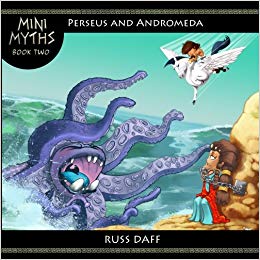Title of the work
Country of the First Edition
Country/countries of popularity
Original Language
First Edition Date
First Edition Details
Russ Daff, Mini Myth Book Two: Perseus and Andromeda. RD Books, 2017, 50 pp.
ISBN
Genre
Adaptations
Comics (Graphic works)
Myths
Target Audience
Children
Cover

Cover courtesy of the Author.
Author of the Entry:
Ayelet Peer, Bar-Ilan University, ayelet.peer@gmail.com
Peer-reviewer of the Entry:
Lisa Maurice, Bar-Ilan University, lisa.maurice@biu.ac.il
Susan Deacy, University of Roehampton, s.deacy@roehampton.ac.uk

Russ Daff (Author, Illustrator)
Russ is a British author and illustrator from Cambridge, UK. He graduated from Falmouth School of Art in 1993 and he works for the computer games industry as well as creating illustrations and cartoons.
Source:
Profile at cambridge-illustrators.co.uk (accessed: July 19, 2019).
Bio prepared by Ayelet Peer, Bar-Ilan University, ayelet.peer@gmail.com
Summary
This is the second book in Russ Daff’s Mini Myth series, which retells myths in comic form for children. The first book introduced Perseus and his quest to slay Medusa. This book continues the adventures of Perseus. At the end of the previous book, Perseus was rewarded by Zeus with Pegasus, the flying horse. In this book, Perseus arrives at Joppa and saves Princess Andromeda. Andromeda’s mother vainly boasts that her daughter is more beautiful than the sea nymphs. The nymphs are angry and wish for revenge. Poseidon then sends a sea-monster against the city and demands the sacrifice of Andromeda. Zeus intervenes and makes Perseus to go to Joppa, and Aphrodite casts a love spell on him and Andromeda. Perseus then kills the monster and saves Andromeda. Together they continue to Seriphos and Perseus rescues Danae from having to marry the king, Polydectes. The king gazes at Medusa’s head and turns to stone and Perseus remains with his mother and Andromeda on the island.
Analysis
The first book emphasized the role of the gods as benevolent. This book also opens with Cassiopeia who tells Andromeda that they are blessed by the gods. Zeus and Athena are once again portrayed as carrying for humans while Poseidon and Hera seem less affectionate and more determined to keep the humans in check.
The author promotes modern ideas of feminine equality and power by having Andromeda refuse to be treated like an object (the "jewel of the kingdom" as her mother calls her). Her mother boasts that she is more beautiful than the sea nymphs and thus makes them angry. Yet this anger is defused and non-threatening since, in keeping with the comic tone of the books, Poseidon agrees to avenge his daughters because he cannot bear listening to them complain anymore.
The book ends with Zeus benignly watching the events and noting that Perseus is the first mortal hero of many. Thus the ending, as in the first book, continues the motif of the caring god and the heroic Perseus. This book places less emphasis on Perseus’ piety and focuses more on his fighting the monster, and on the different female characters who move the plot (Cassiopeia, Hera, the sea nymphs, Athena, and Aphrodite). As mentioned above, this shows the more feminist tone of this book, as well as its focus more on action than on the contemplations of the hero (which were discussed in the first book).
Addenda
The review refers to the Kindle edition.


